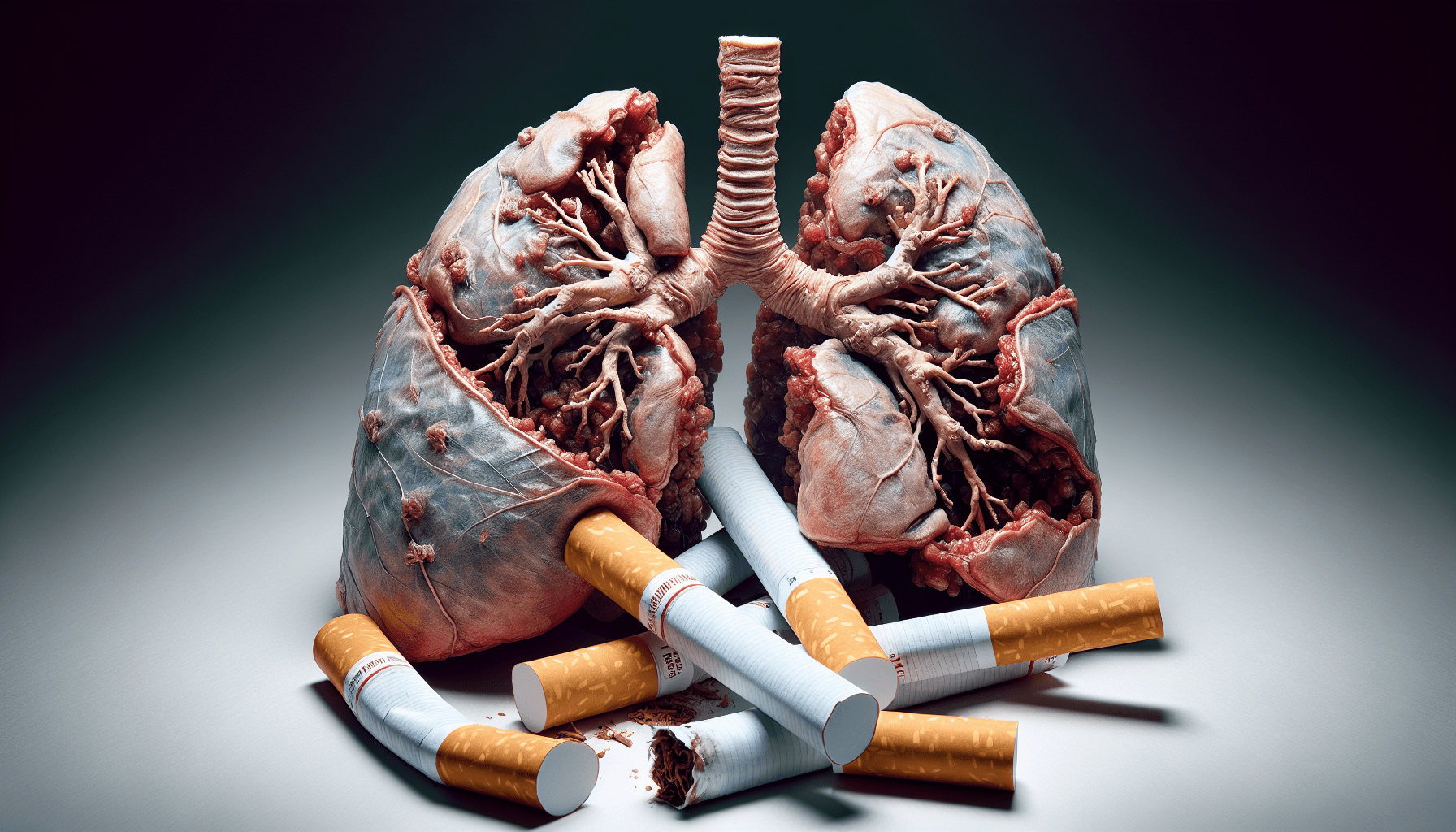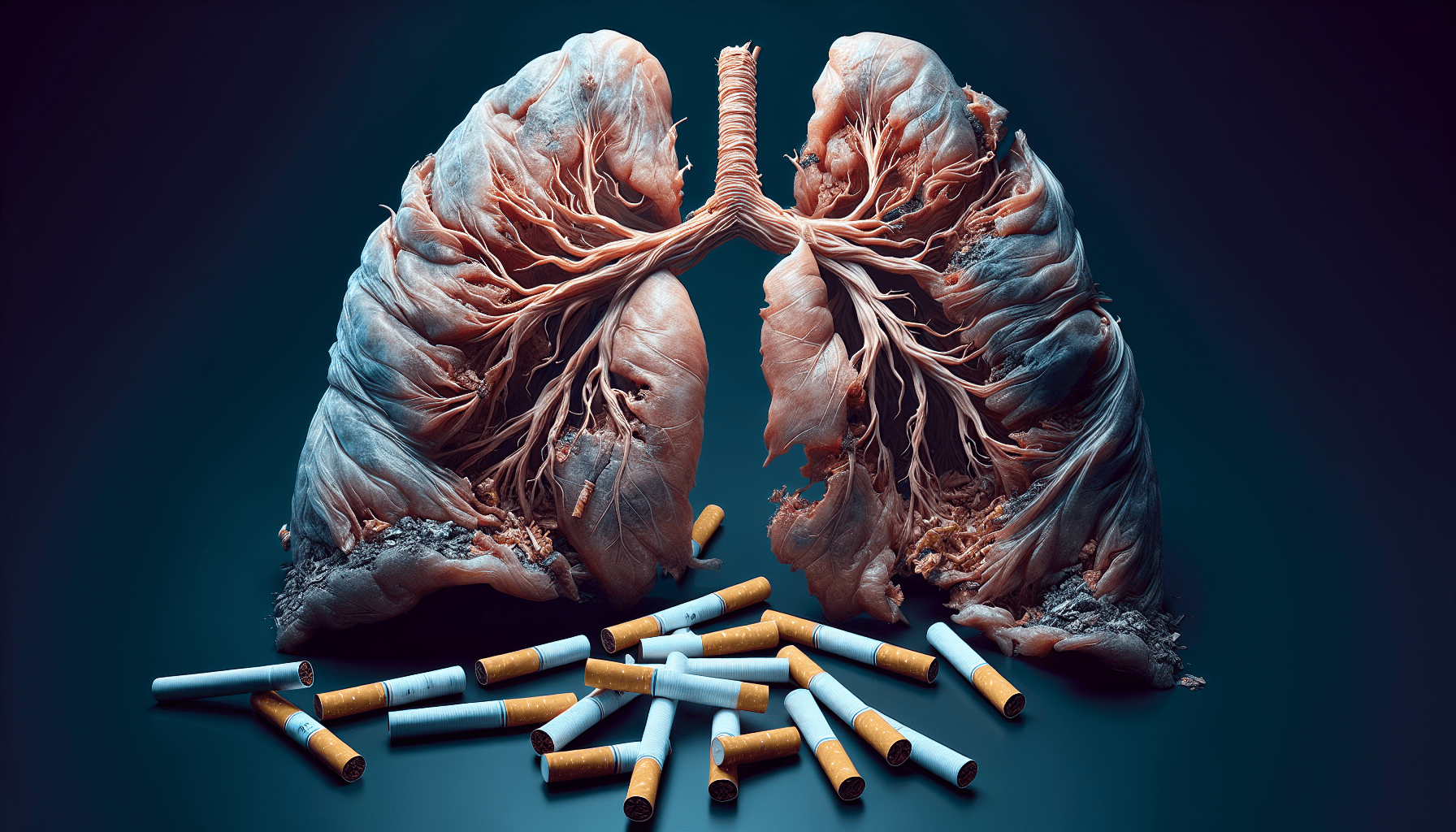Quitting smoking is a commendable decision that comes with numerous health benefits, but it’s important to be aware of the potential health problems that may arise after kicking the habit. While quitting smoking improves lung function, reduces the risk of heart disease, and enhances overall well-being, there are still challenges that one might face on this journey. From weight gain and mood swings to coughing and insomnia, understanding these health hurdles can help you navigate and conquer them with ease. So, let’s delve into the realm of post-smoking health problems and find ways to overcome them, ensuring a smooth transition towards a smoke-free future.
Weight Gain
Causes of weight gain
When you quit smoking, it’s not uncommon to experience some weight gain. There are several reasons why this happens. Firstly, nicotine is an appetite suppressant, so when you stop smoking, your appetite may increase. Additionally, smoking increases your metabolism, meaning your body burns calories at a faster rate. Quitting smoking can lead to a decrease in metabolism, making weight gain more likely. Furthermore, some people turn to food as a substitute for cigarettes, finding comfort in eating to cope with cravings or stress.
Tips to manage weight gain
Although weight gain may be a concern when quitting smoking, there are several strategies you can implement to manage it effectively. First and foremost, maintaining a balanced diet is crucial. Focus on consuming plenty of fruits, vegetables, whole grains, and lean proteins while limiting your intake of processed foods and sugary snacks. Regular exercise is also essential for weight management. Engaging in physical activity not only helps burn calories but can also alleviate stress and reduce cravings. Finding healthy alternatives to cope with cravings, such as chewing sugar-free gum or snacking on carrots, can also be helpful. Remember, it’s important to be patient and kind to yourself during this process. The benefits of quitting smoking far outweigh any temporary weight gain.
Metabolism Changes
Effects of quitting smoking on metabolism
Quitting smoking can have a significant impact on your metabolism. When you smoke, the nicotine in cigarettes stimulates your body to release adrenaline, which increases your metabolic rate. This boost in metabolism can lead to the burning of more calories. However, once you quit smoking, your metabolism can decrease, causing your body to burn calories at a slower rate. This decrease in metabolism may contribute to weight gain. Additionally, quitting smoking can lead to changes in fat distribution within the body, resulting in an increased accumulation of visceral fat, which is associated with various health risks.

How to support your metabolism
Despite the changes in metabolism that occur after quitting smoking, there are ways to support and maintain a healthy metabolic rate. Regular exercise is key to boosting your metabolism. Engaging in cardiovascular activities such as brisk walking, jogging, or cycling can help increase your metabolic rate and burn calories. Strength training exercises are also beneficial as they build muscle mass, which naturally boosts metabolism. Staying hydrated is essential for a healthy metabolism as well. Drinking enough water helps maintain optimal bodily functions, including metabolism. Lastly, ensure you’re getting enough sleep. Lack of sleep can negatively impact your metabolism, so aim for seven to eight hours of quality sleep each night.
The role of exercise
Exercise plays a crucial role in overall health and can have a significant impact on managing weight gain after quitting smoking. Not only does exercise help boost metabolism, but it can also reduce cravings and improve mood. Engaging in regular physical activity releases endorphins, often referred to as “feel-good” hormones, which can alleviate stress and enhance mental well-being. Additionally, exercise can distract you from cravings and provide a healthy outlet for any agitation or restlessness you may experience during the quitting process. Incorporating a combination of cardiovascular exercises, strength training, and activities you enjoy will not only help manage weight gain but also contribute to your overall health and well-being.
Cravings and Withdrawal Symptoms
Common cravings experienced
Quitting smoking can be challenging due to the cravings and withdrawal symptoms that may arise. Many people experience strong cravings for nicotine, often triggered by environmental cues, stress, or other smokers. These cravings can be intense and may manifest as an intense desire for a cigarette or a physical sensation in the chest or throat. It’s also common to experience psychological cravings, where the urge to smoke is linked to certain situations or emotions.

Managing cravings
Successfully managing cravings is crucial for quitting smoking. One effective strategy is to distract yourself when cravings strike. Engage in activities that require focus and keep your hands busy, such as squeezing a stress ball or practicing a hobby. Deep breathing exercises can also be helpful in reducing the intensity of cravings. Taking slow, deep breaths can help relax your body and mind, making the cravings more manageable. It’s also essential to identify your triggers and develop strategies to avoid or cope with them. If being around other smokers triggers cravings, avoid situations where you’ll be exposed to smoking. Lastly, having a support system in place, whether it’s friends, family, or a support group, can provide encouragement, accountability, and guidance during the quitting process.
Dealing with withdrawal symptoms
Withdrawal symptoms are a common part of quitting smoking as your body adjusts to the absence of nicotine. These symptoms can vary in intensity and duration. Some common withdrawal symptoms include irritability, restlessness, difficulty concentrating, increased appetite, and disturbed sleep. It’s important to remember that these symptoms are temporary and will gradually diminish over time. Finding healthy ways to manage these symptoms can make the quitting process more manageable. Engaging in regular exercise can help alleviate restlessness and improve mood. Practicing relaxation techniques such as deep breathing, meditation, or yoga can also reduce stress and promote well-being. Additionally, maintaining a healthy diet, staying hydrated, and getting enough sleep can support your body in overcoming withdrawal symptoms.
Mood Swings and Depression
Impact on mood and emotional well-being
Quitting smoking can have a profound impact on your mood and emotional well-being. Nicotine affects the levels of neurotransmitters in your brain, including dopamine, which is associated with pleasure and reward. When you quit smoking, the sudden absence of nicotine can lead to imbalances in these neurotransmitters, causing mood swings and heightened emotions. It’s not uncommon to experience irritability, frustration, anxiety, or even symptoms of depression during the initial stages of quitting. These emotional fluctuations can be challenging to navigate, but it’s important to remember that they are temporary and a normal part of the withdrawal process.

Tips for managing mood swings
Managing mood swings during the quitting process requires patience and self-care. Engaging in regular physical activity, such as walking, jogging, or yoga, can help improve your mood by releasing endorphins, which are known to boost happiness. Practicing relaxation techniques can also be beneficial, whether it’s through deep breathing exercises, meditation, or spending time in nature. Surrounding yourself with support is crucial during this time. Reach out to friends, family, or a support group who can provide encouragement and understanding. Additionally, finding healthy ways to relieve stress, such as engaging in hobbies, listening to music, or practicing mindfulness, can help regulate your emotions. If you experience prolonged or severe mood swings or symptoms of depression, it’s important to seek professional help from a healthcare provider.
Seeking professional help
If mood swings or symptoms of depression persist or become overwhelming, it’s important to seek professional help. Quitting smoking is a significant life change, and it’s not uncommon to experience emotional challenges during this transition. Mental health professionals can provide guidance, support, and treatment options to help you navigate this period successfully. They can help you develop coping mechanisms, strategies to manage stress, and provide therapy or medication if necessary. Remember, there is no shame in seeking help, and taking care of your mental well-being is just as important as taking care of your physical health.
Respiratory Issues
Changes in lung function
Quitting smoking can have a profound impact on your respiratory system. Smoking damages the lungs and impairs lung function, leading to various respiratory issues. When you quit smoking, your lungs begin to heal, and over time, your lung capacity can improve. One significant change is the improvement in lung function, such as increased airflow and the ability to clear mucus and debris more effectively. This can lead to a decrease in symptoms such as coughing, wheezing, and shortness of breath.

Coping with respiratory issues
While the healing process takes time, there are ways to cope with respiratory issues after quitting smoking. Staying hydrated is crucial for maintaining healthy lung function. Drinking enough water helps thin mucus, making it easier to clear from the lungs. Engaging in regular exercise, particularly cardiovascular activities, can also improve lung function by strengthening the respiratory muscles and increasing lung capacity. Additionally, avoiding exposure to environmental pollutants such as secondhand smoke, air pollution, or allergens can help minimize respiratory symptoms. If you’re experiencing persistent or severe respiratory issues, it’s important to consult with a healthcare professional for further evaluation and guidance.
Importance of lung health
Quitting smoking and maintaining lung health go hand in hand. Your lungs have an incredible capacity to heal and regenerate, but it’s crucial to protect them from further damage. Avoiding exposure to secondhand smoke is essential, as it can be just as harmful as smoking itself. If you work or live in an environment with poor air quality, consider using protective measures such as masks or air purifiers. Regular exercise, a balanced diet, and staying hydrated also play significant roles in maintaining optimal lung health. Finally, staying up to date with routine check-ups and screenings can help detect any potential issues early on and ensure your lungs remain healthy for years to come.
Digestive Problems
Impact on the digestive system
Quitting smoking can have a significant impact on your digestive system. Smoking affects many aspects of digestion, including the production of stomach acid, the functioning of the esophageal sphincter, and the motility of the intestines. When you quit smoking, your digestive system undergoes adjustments, which can lead to various digestive problems. Common issues include acid reflux, indigestion, bloating, constipation, and changes in bowel movements. These symptoms can range from mild to severe and may persist for a while as your body adapts to the absence of nicotine.

Managing digestive problems
Although digestive problems after quitting smoking can be uncomfortable, there are strategies to manage them effectively. Making dietary adjustments can be beneficial to alleviate symptoms. Avoiding trigger foods such as spicy or greasy foods, caffeine, and alcohol can help reduce acid reflux and indigestion. Opting for smaller, more frequent meals rather than large ones can also aid digestion. Consuming plenty of fiber-rich foods, such as fruits, vegetables, and whole grains, can prevent constipation and promote regular bowel movements. Staying hydrated by drinking enough water is essential for maintaining overall digestive health. In some cases, over-the-counter medications or natural remedies, such as ginger or peppermint tea, may provide relief for specific symptoms. If digestive problems persist or worsen, it’s important to consult with a healthcare professional for further evaluation and guidance.
Eating a balanced diet
Maintaining a balanced diet is crucial for overall health and can play a significant role in managing digestion issues after quitting smoking. Focus on consuming a variety of fruits, vegetables, whole grains, and lean proteins. These foods are not only rich in essential nutrients but also high in fiber, which helps promote healthy digestion. Avoiding processed foods and excessive consumption of sugary snacks can also help alleviate digestive problems. Additionally, aim to eat mindfully and at a moderate pace, as eating too quickly or in a stressed state can contribute to indigestion and bloating. Remember, a healthy diet not only supports digestive health but also contributes to your overall well-being.
Sleep Disturbances
Changes in sleep patterns
Quitting smoking can lead to changes in sleep patterns, making it challenging to get a good night’s sleep. Many individuals experience difficulties falling asleep, staying asleep, or waking up feeling unrested after quitting smoking. Nicotine withdrawal can disrupt your sleep cycle, with symptoms such as insomnia, vivid dreams, or fragmented sleep. These changes in sleep patterns can be frustrating and impact your overall well-being, energy levels, and mood.
Tips for improving sleep
Improving sleep quality after quitting smoking requires consistency and implementing healthy sleep habits. Establishing a regular sleep routine can help signal your body that it’s time to wind down and prepare for sleep. Aim for a consistent bedtime and wake-up time, even on weekends. Create a relaxing bedtime routine that includes activities such as reading, taking a warm bath, or practicing relaxation techniques. Ensure your sleep environment is conducive to rest, with a comfortable mattress, supportive pillows, and a dark, quiet, and cool room. Limiting exposure to electronic devices, caffeine, and stimulating activities close to bedtime can also promote better sleep. If difficulties persist, consider speaking with a healthcare professional who can help identify any underlying sleep issues and provide appropriate guidance.
Creating a sleep routine
Creating a sleep routine is essential for establishing healthy sleep habits after quitting smoking. Start by establishing a regular sleep schedule, going to bed and waking up at the same time each day. Consistency is key in training your body to recognize the appropriate sleep and wake times. Incorporate relaxing activities into the evening hours, such as reading a book, practicing yoga, or listening to soothing music. Avoid stimulating activities or screens close to bedtime, as they can interfere with your body’s natural sleep-wake cycle. Create a calming sleep environment by making sure your bedroom is dark, cool, and quiet. Avoid consuming caffeine or heavy meals too close to bedtime, as they can interfere with sleep quality. By implementing these habits consistently, you can enhance your chances of getting a restful night’s sleep and improve your overall well-being.
Oral Health Issues
Effects on oral health
Quitting smoking has numerous positive effects on your oral health. Smoking can wreak havoc on your teeth, gums, and overall oral hygiene. It increases the risk of gum disease, tooth decay, bad breath, and tooth loss. When you quit smoking, you give your mouth a chance to heal and improve its overall health. The absence of smoking reduces the risk of gum disease and allows gums to heal, reducing inflammation and bleeding. It can also prevent staining of the teeth and bad breath caused by smoking.
Maintaining oral hygiene
After quitting smoking, it’s crucial to prioritize your oral hygiene to maintain and improve your oral health. Brush your teeth at least twice a day using fluoride toothpaste and a soft-bristled toothbrush. Make sure to brush all surfaces of your teeth, including the back, and don’t forget to brush your tongue to remove bacteria and freshen your breath. Floss daily to remove plaque and debris from between your teeth and along the gum line. Consider using mouthwash to kill bacteria and freshen your breath, but remember that it should not replace brushing and flossing. Lastly, schedule regular dental check-ups and cleanings to monitor your oral health and address any potential issues.
Visiting the dentist regularly
Visiting the dentist regularly is essential for maintaining optimal oral health, especially after quitting smoking. Dental professionals can assess the condition of your teeth, gums, and overall oral health, providing preventive care and guidance. Regular check-ups allow early detection and treatment of any potential issues like gum disease or tooth decay. Dental cleanings performed by a hygienist will remove plaque and tartar buildup, helping to prevent gum disease and tooth loss. Additionally, dental professionals can offer advice on oral hygiene practices specific to your needs and recommend any necessary treatments or interventions to keep your mouth healthy and free of smoking-related complications.
Skin Changes
Impact on skin health
Quitting smoking can have a significant impact on the health and appearance of your skin. Smoking contributes to premature skin aging, wrinkles, and dullness due to the damage caused by exposure to cigarette smoke and its toxins. It depletes the skin of oxygen and essential nutrients, leading to decreased collagen production and impaired skin elasticity. When you quit smoking, your skin begins to repair itself, improving its overall health and appearance.
Caring for your skin
To care for your skin after quitting smoking, it’s vital to establish a skincare routine that promotes its health and vitality. Cleansing your skin twice a day with a gentle, non-irritating cleanser helps remove dirt, oil, and impurities without stripping your skin of its natural moisture. Moisturize your skin daily to replenish hydration and promote a healthy skin barrier. Look for moisturizers with ingredients such as hyaluronic acid or ceramides that hydrate and soothe the skin. Protecting your skin from UV damage is essential, as smoking can increase the skin’s sensitivity to sunlight. Apply broad-spectrum sunscreen with at least SPF 30 daily, and seek shade during peak sun hours. Eating a balanced diet rich in antioxidants, vitamins, and minerals can also benefit the health and appearance of your skin.
Diet and hydration
Your diet and hydration habits play a significant role in the health and appearance of your skin after quitting smoking. Consuming a nutrient-rich diet that includes fruits, vegetables, whole grains, lean proteins, and healthy fats can provide the essential vitamins and antioxidants necessary for skin health. Incorporate foods high in vitamins A, C, and E, as they promote collagen production, protect against free radicals, and support skin cell regeneration. Staying well-hydrated by drinking enough water is vital for maintaining skin hydration and overall health. Water helps flush out toxins, plump the skin, and improve skin elasticity. Limit excessive consumption of sugary and processed foods, as they can contribute to inflammation and skin problems. Taking care of your skin from the inside out by nourishing it with a healthy diet and hydration will help you maintain a vibrant, youthful complexion.
Long-Term Health Benefits
Reduced risk of diseases
Quitting smoking has numerous long-term health benefits, including a reduced risk of various diseases. Smoking is a leading cause of preventable diseases such as lung cancer, heart disease, stroke, and respiratory conditions like chronic bronchitis and emphysema. When you quit smoking, your body begins to repair itself, reducing the damage caused by smoking-related toxins and improving overall health. With each passing year of not smoking, your risk of developing smoking-related diseases continues to decrease, eventually matching that of a non-smoker.
Improved overall health
Quitting smoking has a profound impact on your overall health. Within days of quitting, your blood pressure and heart rate begin to normalize, reducing the risk of heart disease and stroke. Over time, your lung function improves, and the risk of developing lung cancer decreases. The risk of other smoking-related diseases such as bladder, throat, and pancreatic cancer also decreases. Improved respiratory function, increased energy levels, and improved circulation are just a few of the many benefits that quitting smoking can bring to your overall health.
Longevity benefits
Choosing to quit smoking can significantly increase your chances of living a longer, healthier life. Numerous studies have shown that quitting smoking at any age can extend your lifespan. Even if you’ve smoked for many years, quitting smoking can still provide substantial benefits. Research has found that individuals who quit smoking before the age of 40 can gain almost the same life expectancy as non-smokers. Quitting smoking not only adds more years to your life but also improves the quality of those years, reducing the risk of chronic diseases and improving overall well-being.
In conclusion, quitting smoking is a transformative and life-changing decision with numerous health benefits. While it may come with challenges such as weight gain, cravings, mood swings, and health issues, being aware of these potential effects and implementing strategies to manage them can greatly enhance your success in quitting smoking. Remember to be patient and kind to yourself throughout the process, and consider seeking professional support when needed. The journey of quitting smoking is an investment in your health, well-being, and longevity, allowing you to experience a better quality of life for years to come.
